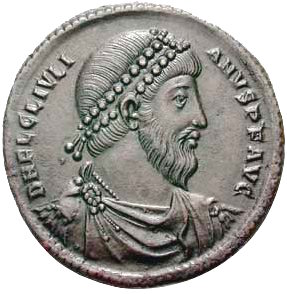In the November 1940 issue of La Vita Italiana, Julius Evola, writing under the pseudonym “Arthos”, addressed the ancient concept of race in the article “Sulle origini e sul doppio volto del razzismo”. We here are interested in the Emperor Julian, known as the Apostate. In this article, Evola aligns himself with Julian and states his opposition to the scientistic, genetic view of the origins of races, nations, and castes.

Flavio Claudio Giuliano was the last of the pagan Roman emperors, the nephew of Constantine, who had established Christianity as the religion of the Empire. After several successful military campaigns against the Germans and Gauls, Julian became Emperor following the death of his cousin Constantius and resided in Constantinople, the seat of the Eastern part of the Empire. In the tradition of Marcus Aurelius, Julian was a philosopher-king. Although raised as a Christian, he abdicated under the influence of neo-platonic philosophy, which he studied in Athens (and was the classmate of two future saints: St. Basil the Great and St. Gregory). Apparently, he was initiated into the Eleusinian Mysteries and Mithras. As Emperor, he tried to govern on these three planks:
- Roman Tradition
- Hellenic Culture
- Neoplatonic philosophy
In short, we have a unique man: warrior, philosopher, emperor, initiate who supported the fundamental supporting principles of Western civilization. So what went wrong? Julian was not content to be non-Christian; he became anti-Christian. This led him to rule by force and violence, something Evola has warned against. He forced Christians out of state administrative duties and created martyrs, so any positive contributions he made were forever forgotten under the rubric of Julian the Apostate. A more cautious man may have noticed that his program was already in effect.
- Roman Tradition. He was concerned about the parallel hierarchy in the Church that mirrored the leadership hierarchy. Well, because of the hierarchy, the Catholic church was able to sustain Roman tradition and law well into the Middle Ages.
- Hellenic Culture. He forbade the Christian schools from teaching Greek literature. This just isolated the Christians from Hellenic culture. Prior to that, Homer’s epic poems were considered divinely inspired, Alexander was considered a saint, and Plato a revealer of divine Truth.
- Neoplatonic philosophy. Christian theology was founded on Neoplatonism and should have been encouraged.
Although he himself did not believe in the existence of the Roman gods (he was a monotheist), he nevertheless tried to re-establish their cult. The problem is that once the noble lie is no longer believed, you cannot just will it back into existence. All that is now moot, in any case, since the so-called Reformation of the Northern peoples did much to destroy the triple foundation of Western civilization. So let’s move on to Evola’s points. Evola summarizes Julian’s position:
Against the Christian conception of the generation of men from a single couple, this emperor held to the doctrine of multiple creations, that is, of the diverse origins of men, unequal in race and disposition in the primordial times of the immortal gods. This idea reflects traditions very familiar to the ancient aryan peoples, which accounts for the differences not only of race, but also of castes and lineages [or nations, stirpe], by fundamentally distinct divine or demonic symbolic figures.
Thus, in his monotheism and polygenism, Julian is aligned with the theories of Herman Wirth. It is important to note here that Julian claims that races, nations, and even castes have their origin in spiritual differences, not because of genetic factors. This is why Evola quotes him approvingly as one of the advocates of the Traditional doctrine of spiritual races. The modern mind can see origins only in term of time, in the past. So to them, the origins of man appear to be singular from the genetic perspective; even more absurdly, the genetic view would trace man’s origin to the orangutan.
Evola next addresses Thomas Campanella’s City of the Sun. Although the City is based on traditional principles, such as rule by the philosopher-king and solarity, Evola notices the beginning of a more modern idea of race. For the Solarians, breeding is planned in the same way that horses or dogs are bred. This Evola criticizes as a rationalistic and mechanical approach. Evola then relates Campanella’s “solar race” to the the Aryan-Hyperborean “super-race”, and to the conception in the Middle Ages:
the idea of race, united from the beginning to the idea of a public service, constituted one of the fundamental conditions of the nobility of the Middle Ages; a condition considered so natural, that no one thought of having to express it in words, much less in an “myth” or a theory. Let’s keep in mind that, in later periods, “science”, in the modern sense, appears always as the enemy of this true aristocracy, faithful to the idea of race up until the period of the Enlightenment, the precise point where the scientistic myth, in strict connexion Masonic agitations, helped it to dig its grave.

Leave a Reply